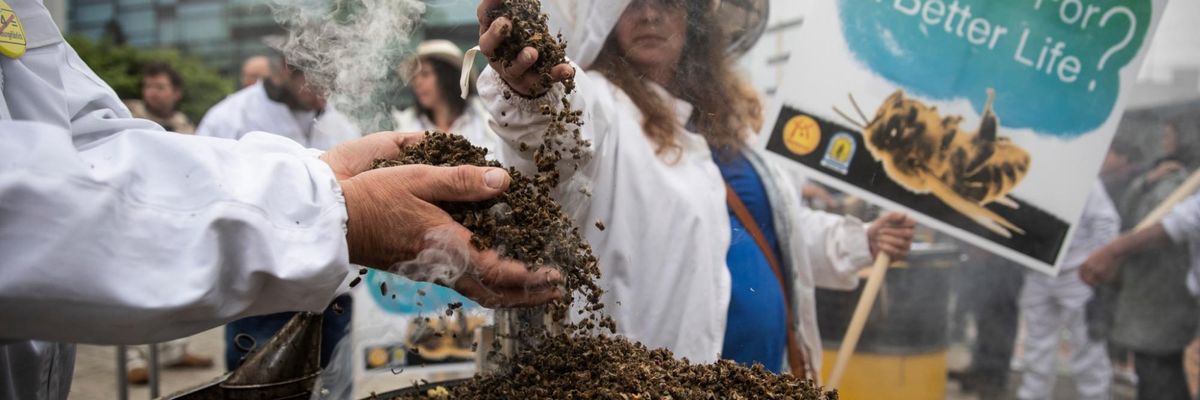The European Union's highest court ruled Thursday that member states must stop authorizing the use of bee-killing neonicotinoid pesticides.
Neonicotinoids are prohibited under E.U. law, but a loophole has enabled governments to grant emergency derogations temporarily permitting the use of seeds coated with these and other banned toxic insecticides.
Thursday's preliminary ruling by the European Court of Justice immediately halted derogations for neonicotinoids, which accounted for nearly half of the 236 exceptions that E.U. countries provided from 2019 to 2022. Bartosz Brzeziński, a food and agriculture reporter at Politico Europe, called the decision a "potentially fatal blow" to the highly hazardous class of pesticides.
Campaigners applauded the ruling, issued in response to a complaint filed by Pesticide Action Network (PAN) Europe, Nature & Progrès Belgium, and a Belgian beekeeper.
"This verdict is a reminder that administrations and politicians are bound to the law, not to the interests of the pesticide industry, or industrial agricultural lobbies."
"PAN Europe has been fighting this maladministration for many years," Hans Muilerman, a chemical officer for the group, said in a statement. "This landmark ruling of the E.U. court puts an end to 10 years of abuse by member states, with the blessing of the European Commission. Thanks to our action, the E.U. environment will become a safer place."
The plaintiffs originally asked the Belgian Administrative Court to intervene in 2019 after Belgium, at the behest of the sugar lobby, approved emergency use derogations for neonicotinoid-coated sugar beet seeds.
"This success will have an E.U.-wide effect, to protect bees and insects across the E.U., as well as citizens' health," said Marc Fichers, secretary-general of Nature & Progrès Belgium. "Derogations with neonicotinoid-treated seeds are now definitely banned. This ruling is relieving and shows the environment counts more than profits from some sugar and pesticide companies!"
The European Environmental Bureau, a continent-wide network of green groups, also welcomed the ruling, describing it as "good news for bees" while demanding further action "to protect biodiversity, human health, and food security."
In 2013, the European Commission banned the use of imidacloprid, clothianidin, and thiamethoxam—three neonicotinoids lethal to pollinators—on bee-attractive crops including maize, rapeseed, and some cereals. This was followed by a prohibition on all outdoor uses in 2018.
The Court of Justice upheld the ban in 2021, rejecting an appeal by Bayer, the German pharmaceutical and biotech company that merged with agrochemical giant Monsanto more than four years ago and produces imidacloprid, clothianidin, and thiamethoxam.
As Euractiv reported Thursday:
The latest ruling concerns six authorizations issued by the Belgian state for the use of these plant protection products on the basis of 'emergency situations'—where danger or threat to plant production or ecosystems cannot be contained by other reasonable means.
For this reason, the court concluded that "as regards seeds treated with plant protection products containing substances expressly prohibited, […] the [E.U.] legislature did not intend to allow member states to derogate from such an express prohibition."
The ruling added that member states have an obligation "to take all necessary measures to promote low pesticide input pest control, giving priority to non-chemical methods wherever possible."
Reflecting on the case, PAN Europe executive director Martin Dermine said that "it was very shocking to observe that the European Commission kept protecting the abuses of the system by member states."
"The commission supported the provision of derogations for supposedly E.U.-banned pesticides that are highly toxic to human health and the environment," said Dermine. "It was evident that the commission stood on the side of agribusiness, rather than with citizens' health and the environment. The European Commission's lawyers even told the judges that member states only give a derogation when no alternative exists, which is opposite to the reality!"
"Today is a great day for European pollinators and for our environment," Dermine declared. "The E.U. pesticide law gives priority to citizens' health and the environment but its implementation at E.U. and national levels is poor. This verdict is a reminder that administrations and politicians are bound to the law, not to the interests of the pesticide industry, or industrial agricultural lobbies."
PAN Europe attorney Antoine Bailleux added that "the Court of Justice has made it clear that substances prohibited at the E.U. level for health or environmental reasons cannot be introduced through the back door at the member state level, which had become common practice."
